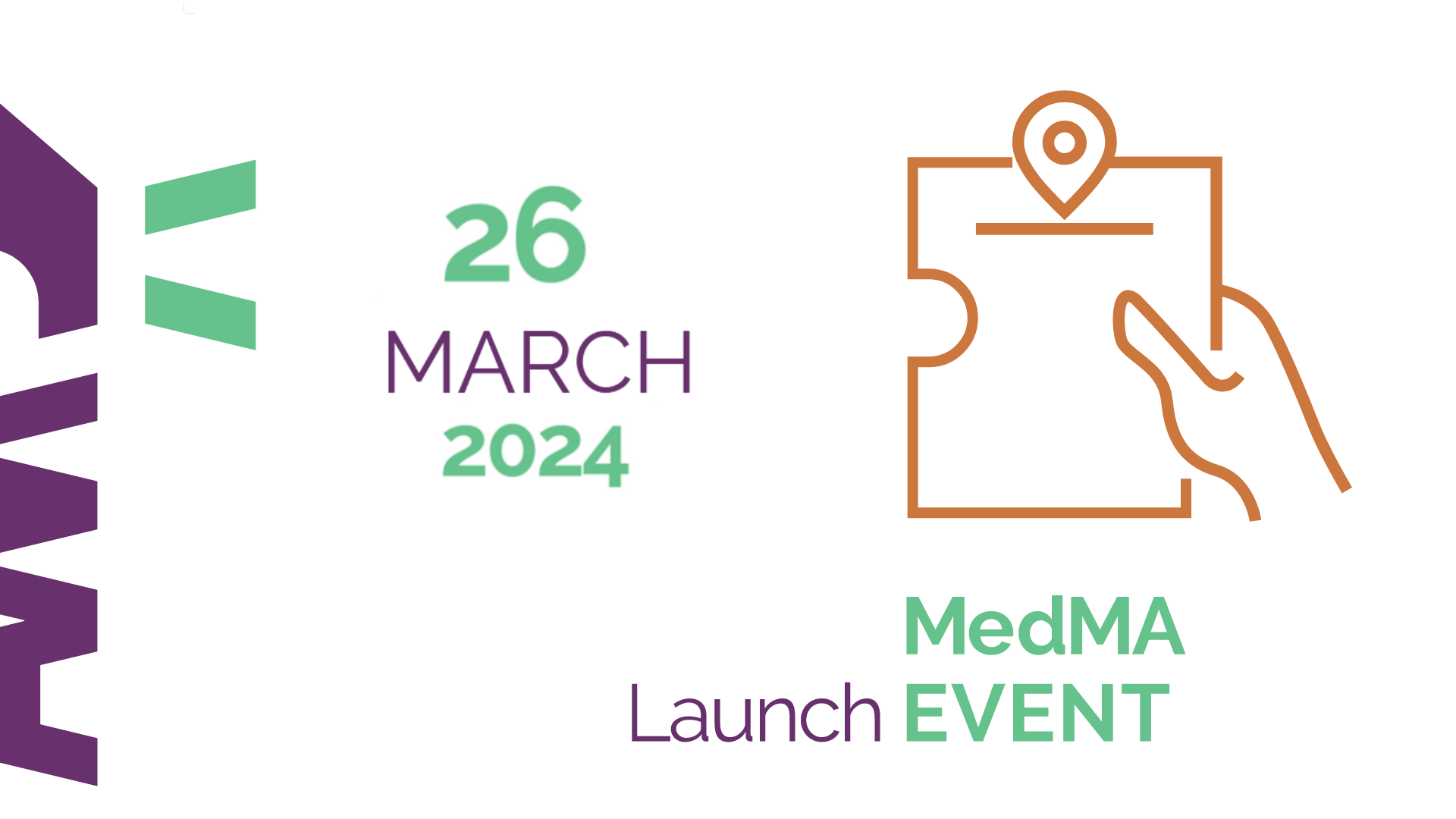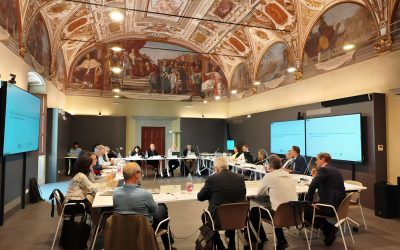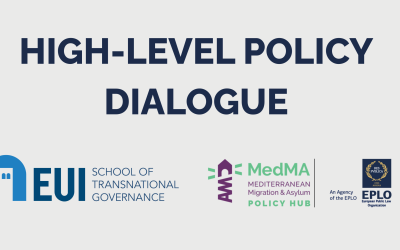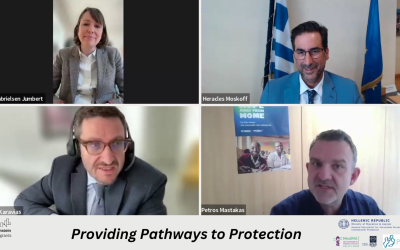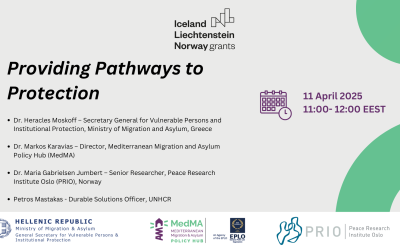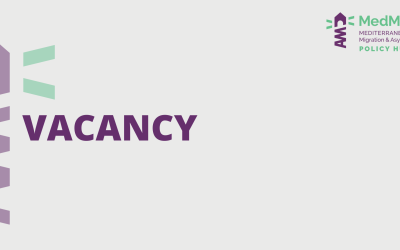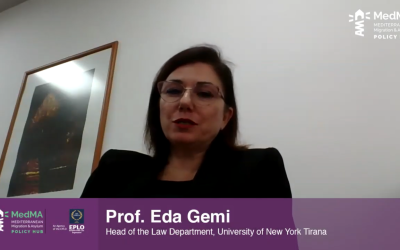The Mediterranean Migration & Asylum Policy Hub celebrated its inauguration in Greece, on March 26th, 2024, with an event on Greek migration and asylum policy. It was a timely discussion, inspired by the political agreement on the new Pact on Migration and Asylum, featuring politicians who have played a pivotal role in managing the arrival and integration of migrant and refugee populations during critical moments in Greece. The event video is available here.
The Director of the European Public Law Organization, Professor Spyridon Flogaitis, opened the discussion, welcoming the participants and offering introductory remarks from the viewpoint of Public Law. According to Flogaitis, “state reform is necessary in order to address the new reality, namely that our societies are de facto multicultural and consist of people from different origins”.
The Director of the Mediterranean Migration & Asylum Policy Hub, Dr Markos Karavias, underlined that the political agreement on the New Pact on Migration and Asylum marks the completion of the last phase of a painful negotiation process. A number of pressing issues were mentioned: The fair balance between responsibility and solidarity, the defence of the fundamental rights of third country nationals, the need to manage the borders, the European Union’s external relations with third countries; in short, the link between state sovereignty and the phenomenon of human mobility. “Today’s debate is a unique opportunity to reflect on Greece’s experience in the formulation and implementation of migration and asylum policies in recent years, the lessons learnt, the challenges faced and, to this end, we are honoured to host politicians who have managed the phenomenon at key junctures. The logic of today’s debate echoes the logic of the MedMA as a space for exchanging views, transcending political differences. An ambitious, but necessary project” he stated.
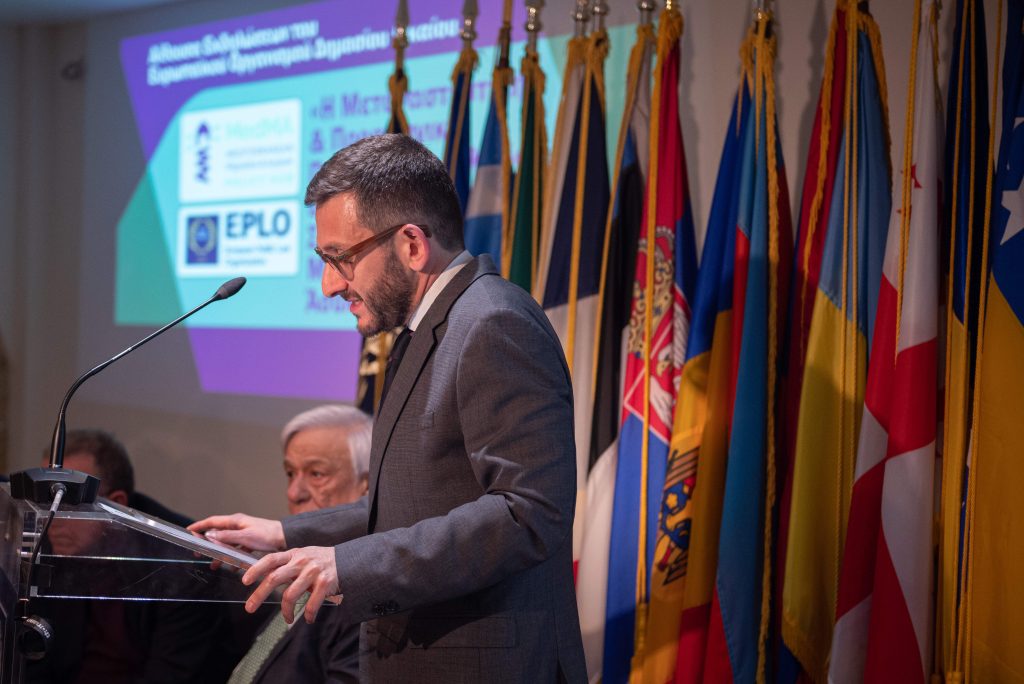
Dr Markos Karavias
The former President of the Hellenic Republic & Academic, H.E. Prokopios Pavlopoulos, made a thorough analysis of the 2008 European Pact on Immigration and Asylum. “The European Union has a duty, on the one hand, to treat refugees and migrants with full respect for their Fundamental Rights without exception; and, on the other hand, to effectively guarantee its borders and to enforce the fairest possible distribution of responsibility among the Member States.” This major challenge concerns the whole of the European Union; however, the fate of these kinds of texts is to be general and open to several interpretations, in order to reach the needed consensus between member states. “Europe has a migration policy on paper; its implementation has always and to a large extent been delayed, incomplete and unfortunately hypocritical.” Taking stock of this experience, Professor . Pavlopoulos concluded with the hope that, when and to the extent that it is finalised, the new Pact will be effectively implemented in practice.
Minister of Migration and Asylum, Dimitris Kairidis, noted that the only way to counter criticism and pessimism is to put things in perspective. “Europe faces many problems but problems exist everywhere, and I don’t say this to underestimate our dichotomies and polarisation, but to give a broader picture of the issue”. The new Pact on Migration and Asylum is the product of a historic compromise; as any compromise, it is obviously open to criticism, but in the opinion of the Greek government, it is better than nothing –, it is also better than what we had before. “We should always remember that migration is a continuous phenomenon, it is not something recent, it is something that is absolutely inherent in human civilization. In a sense, human civilization is a product of migration and the world is made better in principle by migration. This does not mean that it should remain unregulated and that it should not be managed for the benefit of the societies that receive migration flows.” he stated.
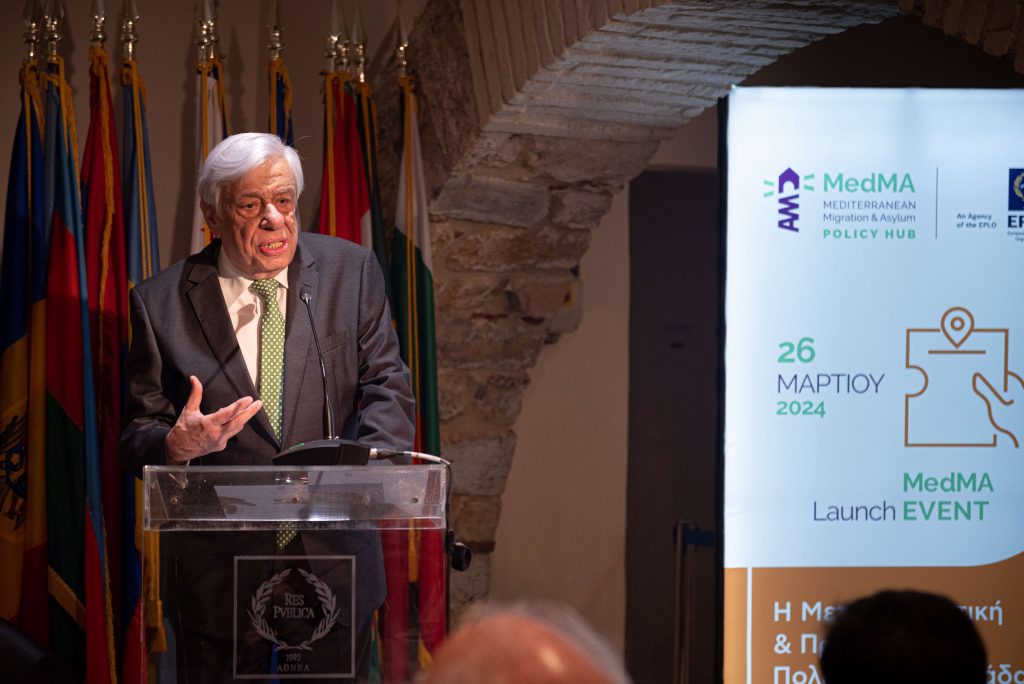
H.E. Prokopios Pavlopoulos
The former Minister of Citizen Protection & former Minister of Migration and Asylum, Notis Mitarachi, underlined that “the critical balance we need to maintain is between border management and legal pathways ”, citing concrete examples from the recent past: the humanitarian corridor for hundreds of women from Afghanistan, a new institution for the country; the proposal for a common European protection area in the EU, which was not accepted; the conclusion of agreements with countries such as Bangladesh to provide legal pathways to Greece In conclusion, with regards to the new Pact on Migration and Asylum, he added that “the legacy of the Dublin regulation continues to set hard limits on responsibility, placing a disproportionate burden on the first entry states in dealing with a crisis that affects the whole European Union.”
Professor Emerita of the University of Athens & former Minister of Labour and Social Security, Ms. Louka Katseli began by stressing the need for institutional continuity, as well as the importance of drawing on historical lessons to identify effective and ineffective policy measures, ensuring that we build on previous knowledge rather than starting anew each time. “Let me start by saying that the economic, social and institutional environment shapes the priorities of migration and asylum policy. It is no coincidence that today we are mainly talking about asylum and the management of migrant influxes, and that we are hardly talking about the smooth integration of migrants into local societies”. According to Professor Katseli, migration is perhaps the most difficult public policy issue because it involves all areas and levels of government; it needs reforms on all levels and a thorough analysis of existing good practices. She concluded that these issues of migration and security should not be left to the far right; all political forces, conservative, centrist and left-wing, should address this issue because it is a matter of democracy.
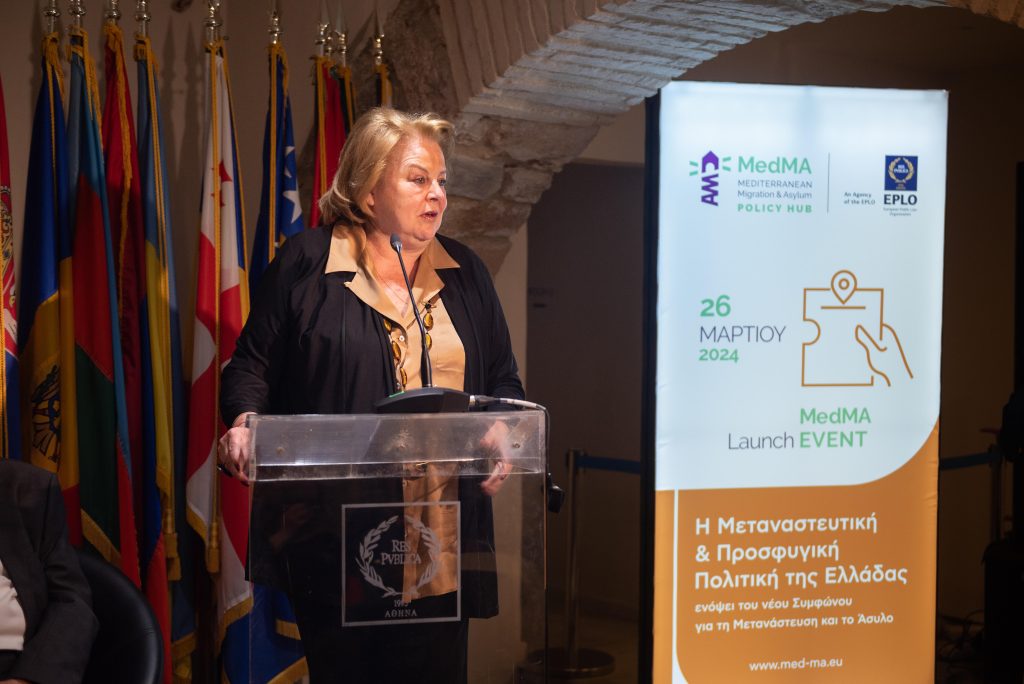
Professor Louka Katseli
The former Minister of Migration Policy, Yannis Mouzalas, underlined that the only dilemma that one must have in mind in order to be able to manage migration in a sober and effective way is the one between the rule of law and the violation of the law. “When we talk about migration, we must understand it as a balance of rights between arriving and host population.” He analysed the institutional changes and policies that were made under the very difficult circumstances of the 2015 crisis, for example the development of the asylum service. He also stressed the importance of highlighting positive examples of integration rather than having a one-sided focus on reactions, citing the example of access to education. He concluded by underlining that “solidarity in the European Union is a legal concept. It is not a moral rule”, highlighting the importance of shifting issues from the national to the European and international level.
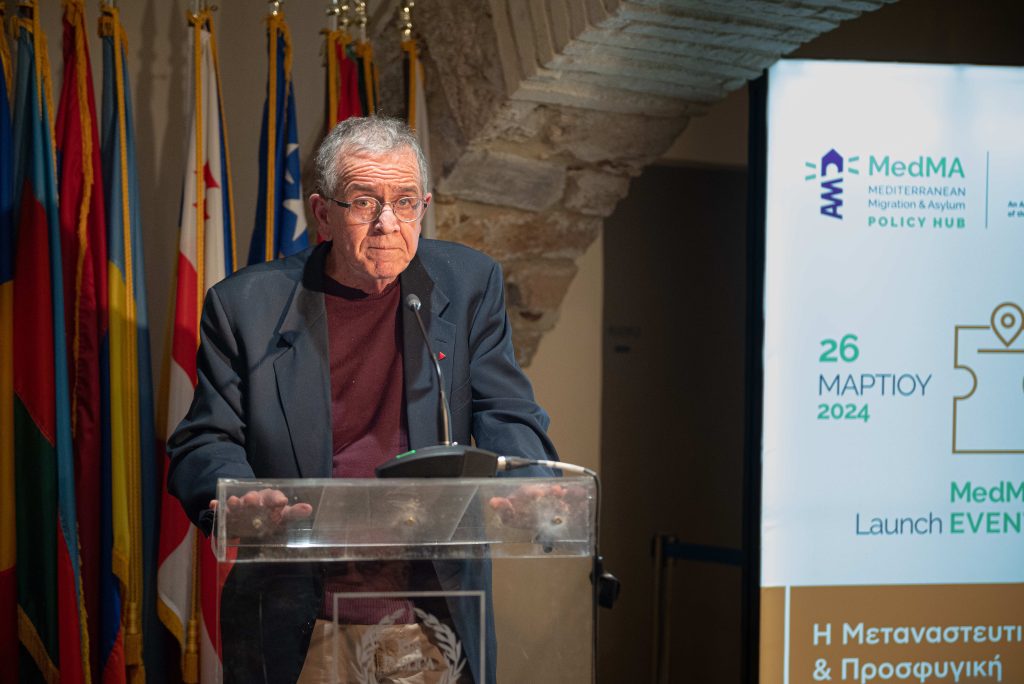
Yannis Mouzalas
The former Commissioner of the European Union & former Minister, Christos Papoutsis, took a retrospective look at policy design in a period of increased supervision on the asylum and reception system, on the conditions of detention at the borders, but also on the real risk of exclusion from the Schengen Treaty. He concluded by highlighting the importance of collaboration: “I am sure that if there was more experience in the field […], if there was constant communication and exchange of views with civil society and local government, we would not have experienced such a rise of the far right, we would have found solutions. Just as I am absolutely sure that if we altogether cooperate to look at the details that come behind the lines with the new Pact, we will be able to find an action plan to prevent the risks of a possible increase in migration flows and at the same time find solutions that are to the benefit of Greek society.”
Finally, the former Alternate Minister of National Defense & former Minister of Migration Policy, Dimitris Vitsas, made an extensive reference to the reasons that drive people to migrate and the legal and humanitarian obligation to rescue and protect their rights irrespective of their status. He also highlighted the issue of institutional discontinuity in public administration, specifically acknowledging the international organizations and institutions that backed the administrative efforts during the crisis. Looking ahead, he pinpointed the primary challenges: combating traffickers and enhancing cooperation among security forces; advocating for a unified asylum system; addressing the need for shared responsibility; the establishment of a comprehensive return system; and, crucially, the urgent requirement for global peace-building initiatives.
Image credits: Maro Verli

